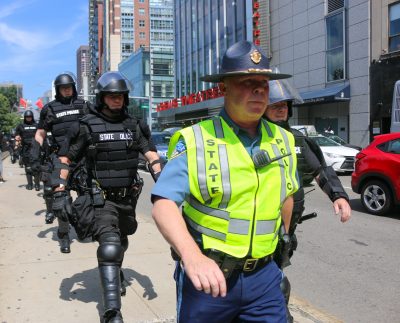
The Massachusetts State Police will be introducing a new body camera pilot program in an effort to initiate a series of operational reforms, state police superintendent Kerry Gilpin announced in a press release Monday.
The pilot program will last six months and include about 100 state police officers, who will wear body cameras from different vendors in order to select the best one, according to the release.
Gilipin said in the release that the state police is evaluating different body camera platforms to find the best solution.
“Body cameras offer the potential to bring a new level of officer safety, transparency, and accurate documentation to the tens of thousands of interactions our personnel have with the public every year,” Gilpin said in the release.
The press release stated that the cameras will increase accountability for state troopers, as well as more accurately document the force’s interactions with criminal offenders and the public.
Eric Nagobads, 50, of Foxborough, said accountability makes body cameras a necessity for police officers.
“They should be [wearing body cameras] because there’s a lot that happens, and it’s always, ‘He said, she said,’” Nagobads said.
Last June, the Boston City Council approved $2 million in funding to implement a body camera program at the Boston Police Department for 2019. The funding covered the cost of camera equipment for 400 of the BPD’s 2,100 officers, though the program has not yet begun.
Daniel Medwed, a professor of law and criminal justice at Northeastern University, wrote in an email that while the implementation of body cameras has the potential to instill a layer of trust between police and the civilians they protect, some questions are still in the air.
“If an incident does occur, there is a record of it that will prove useful in determining the legal implications,” Medwed wrote. “On the other hand, the details are critical. What protocols are in place to ensure the police actually keep them on? What about protecting civilian privacy during certain situations? What about storage and maintenance?”
Amy Friedman, 64, of Sudbury, said body cameras can help ensure that unbiased justice is provided for all parties involved in an incident.
“The camera is supposed to be a neutral object that is supposed to help us record exactly what transpired when an issue occurs,” Friedman said.
Roslyn Pedlar, 56, of West Roxbury, also said she thought body cameras could be effective.
“I think it’s a good idea,” Pedlar said, “as long as it’s implemented properly and in a way that the guidelines for keeping the cameras on and their interactions [with] people are clear and fair.”










Great article on the introduction of body cameras. I believe body cameras can make a difference and it demonstrates, Boston police truly want transparency trust and unity for the people not just in Boston but for all that come, from near and far. I commend state police Kerry Gilpin and everyone that believes this program can be effective.
Great article. Awesome Job Tori! I can’t wait to read your next article.
Love it ! Something we all need to be talking about! Keep up the good work
Good points were made, I would like to read an updated article on this this once it’s been in use for some time.
Great article! I do believe the implementation of body cameras will be a great asset for law enforcement officers overall. However, protocols and strict consequences for violating such protocols also has to be enforced in order for the use of body cameras to be an effective tool.
Thank you for writing such an informative article. It allowed me to see how civilians and officers will benefit from this program. It’s a great way to keep all parties involved accountible for their actions.
Very good article. Very informative. This is a good way for the police and civilians to enter act after the fact with what actually happened. I think they will help in the long run. Hopefully, they have in place some security measures of the videos to insure that there’s no tampering later on.